
The IIIT Books-In-Brief Series
The IIIT Books-In-Brief Series is a valuable collection of the Institute’s key publications written in condensed form to give readers a core understanding of the main contents of the original. These short, easy-to-read, time-saving versions, act as companion synopses, and it is hoped will stimulate readers into further exploration of the original, as well as related topics. These are available in English and translated into other lanuages, mainly German, Italian, and Spanish.
Books-in-Brief Boxset:
The IIIT London Office announces the production of a new Box Set Edition - a collection consisting of the first 17 booklets from its English Books-in-Brief Series.
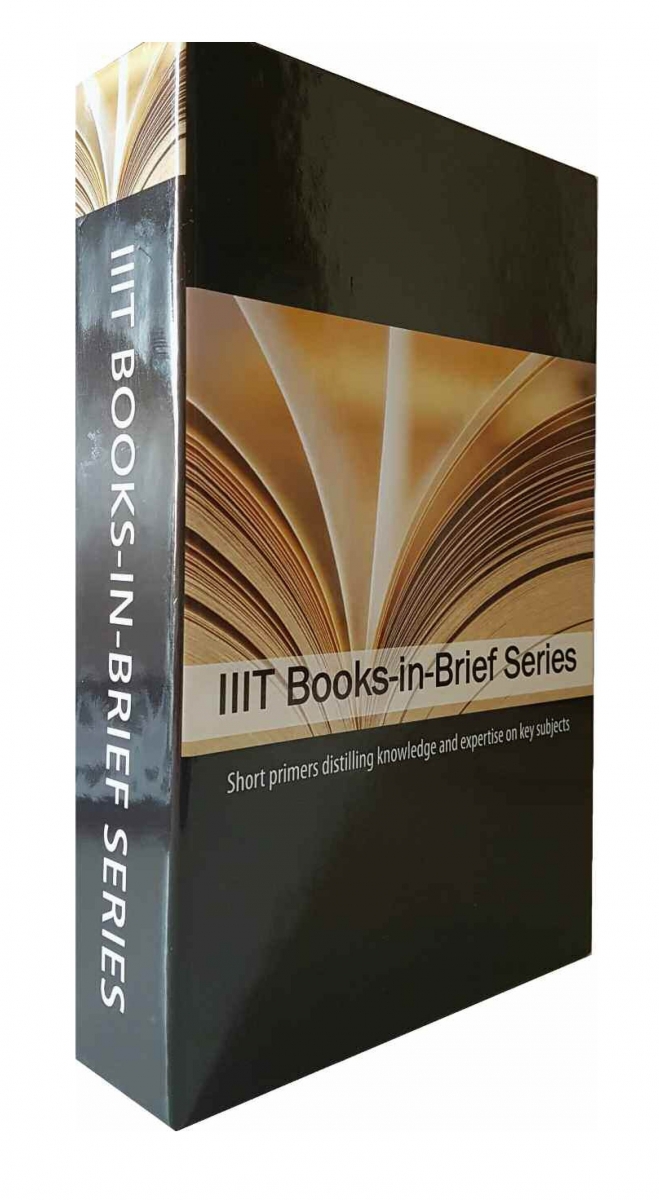
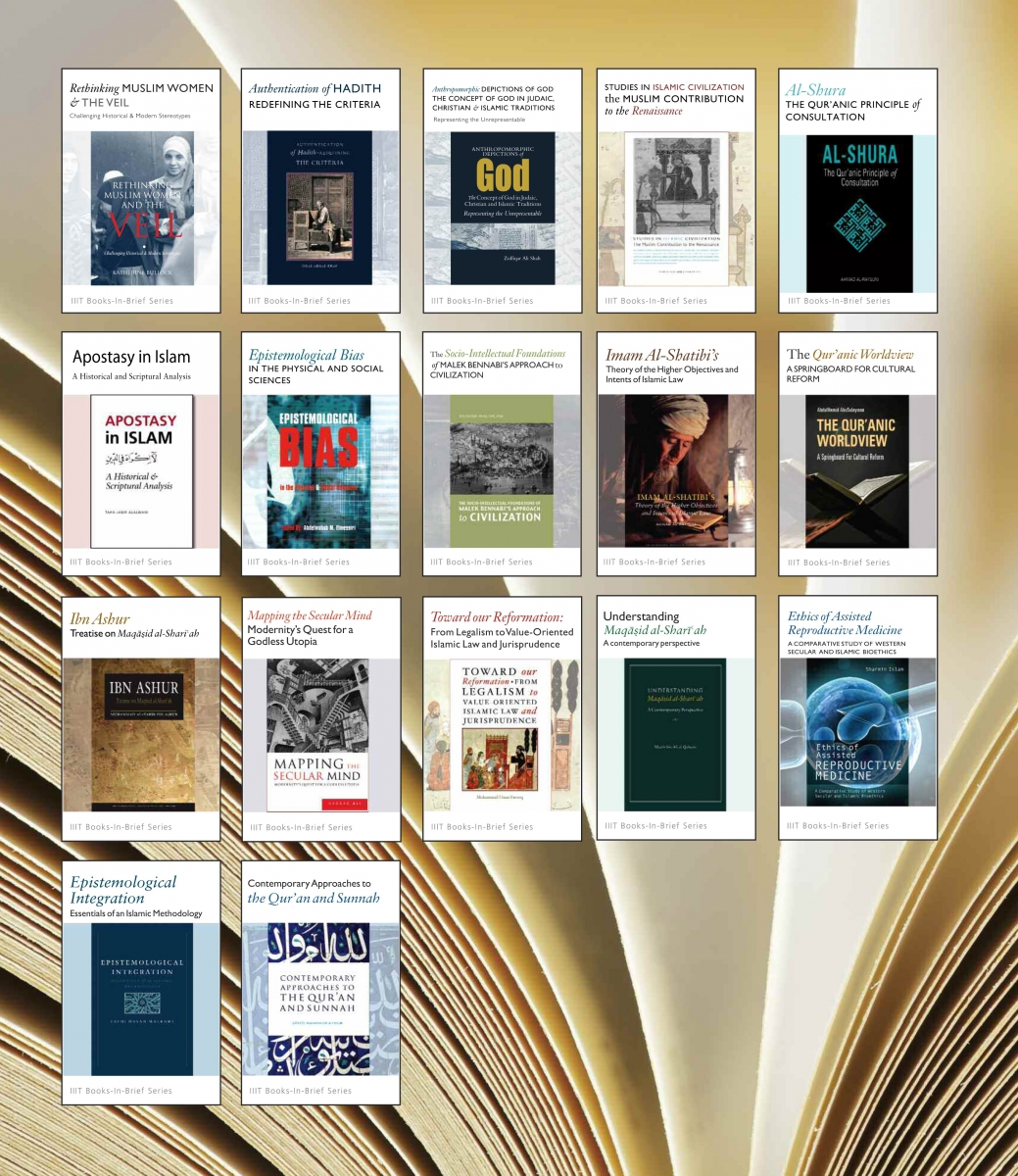
Books-in-Brief (No.23): Rethinking Reform in Higher Education: From Islamization to Integration of Knowledge

(Abridged edition of the book of the same title by Ziauddin Sardar and Jeremy Henzell-Thomas)
ISBN: 978-1-56564-954-5, 2017
What is wrong with Education today? Why is society in decline? Why does the pursuit of knowledge seem to produce adults who despite their qualifications remain ill-equipped to change the world for the better? What future does humanity face if we cannot find the tools to fix the world we share? One essential tool is the development of education, but are ‘aims and objectives’ simply enough. In order to fix the ethical moral ‘spirit’ of humanity perhaps we first need to rekindle the ‘spirit’ of Education, and ask ourselves “what is Education really about and what does humanity really need?” What knowledge has been ‘lost’ over the centuries? The Reform of Higher Education in Muslim Societies proposes a paradigm shift in critical thinking aimed at the issues facing education and it’s bearing on society and humanity at large. Building upon existing disciplines, improving upon them, and innovating new ones could be seen as a way forward. By recognizing the ethical and spiritual norms of Muslim society, and their guiding principles and spiritual identity, together with the plurality and diversity of the modern networked world, this work seeks to replace the sterile and uniform approaches to knowledge with a broader and more creative understanding of a global shared reality. Moderation, balance, effective communication, and mutual respect are paramount features of the underlying philosophy, essential for developing a more effective Education paradigm – one that will help humanity face present and future challenges.
Books-in-Brief (No.22): Reviving the Balance: The Authority of the Qur'an and the Status of the Sunnah
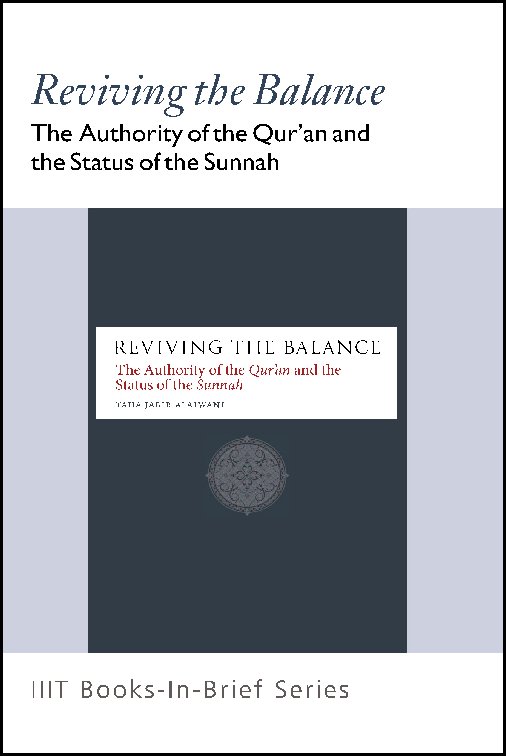
(Abridged edition of the book of the same title by Taha Jabir Alalwani)
ISBN: 978-1-56564-984-2, 2017
The relationship between the Qur’an and the Sunnah remains a most interesting and researched field of study, especially when considered from historical, theological and spiritual perspectives. In Reviving the Balance the author carefully examines the development of the oral and written traditions that constitute the Sunnah. This development historically led to monumental work undertaken by past scholars to verify the authenticity of reports, and the character and reliability of narrators involved, in recording the Prophet’s life, words, and actions. Eventually this became an overwhelming maze of information. Navigating the maze required interpretation, contextualization and categorization of the information. The author makes the case that despite the praiseworthy intention and effort to emulate the Prophet, once the Sunnah had been collected the Muslim community began to neglect the Qur’an in favour of these narrations. This preference of the Sunnah over the Qur’an became ‘acceptable’ under the pretext that such narratives ‘contained’ the Qur’an. Furthermore, these narratives were then abandoned in favour of Islamic jurisprudence under the pretext that such juristic texts tacitly included both the Qur’an and the Sunnah. This work aims to restore the relationship between the two, so that the Prophetic Sunnah is inextricably and harmoniously linked to the Qur’an, thus avoiding contradiction and conflict between the two.
Books-in-Brief (No.21): Ijtihad and Renewal
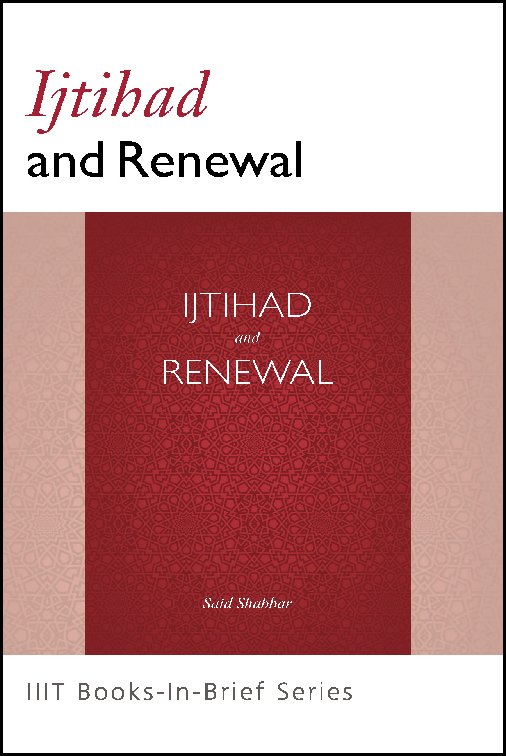
(Abridged edition of the book of the same title by Said Shabbir)
ISBN: 978-1-56564-981-1, 2017
During the early centuries of Islam, the various issues and challenges that faced the rapidly expanding Muslim community of the time were tackled using intelligence and independent reasoning. These were derived from the Qur’an and Sunnah – a practice known as ijtihad. As the centuries wore on the gates of ijtihad were generally closed in favour of following existing rulings, by way of analogy, developed by scholars. And as reason and intellect, now held captive to schools of thought (madhahib) and earlier scholarly opinion, stagnated, so inevitably did Muslim societies. Ijtihad and Renewal is an enlightening and uplifting analysis of ijtihad and the contribution that it can make to a positive Muslim revival in the modern world. The author makes the case that simply grafting solutions rooted in the past onto the complex and unique realities of our own age, has paralysed the creativity and effectiveness of Islamic thought. In order to restore a sense of purpose and direction, and to revive Muslim societies from centuries of decline and slumber, we first need to revive the essential practice of ijtihad. Focusing attention on contemporary context-based critical and creative thinking, effective and powerful solutions can be developed for our times. These solutions are based upon the Qur’an and Sunnah, but also from distilling the wisdom and experience of the past for the present – the rich intellectual and spiritual legacy brought bang up-to-date to face the challenges of a global shared contemporary reality.
Books-in-Brief (No.20): Contemplation: An Islamic Psychospiritual Study (New Edition) - Publication In Production
[cover]
(Abridged edition of the book of the same title by Malik Badri)
ISBN: 978-1-56564-980-4, 2018
The human race is in crisis and very few of us – if any – are able to understand what is wrong with our lives and the world at large. How did this happen and how did humans become ‘disconnected’ with humanity? Given the atrocities and scale of human disaster that we see around the world today, why is the human race in a race to be ‘inhuman’? Why are psychological disorders such as depression, anxiety, fear, and suicide on the increase, and why are conventional Western therapies unable to stem the tide?
To come even close to answering these questions we must first look inside ourselves – to explore our own purpose in life and extend that principle to the rest of humanity and the world at large. Despite the advances of modern Western psychology and development of therapies that do help many, especially those vulnerable and in great need of support, one area that is still completely unrecognised or at best under-represented, is that of the ‘human spirit’ and spirituality – since it is more convenient to consider the human mind as ‘machine’ that responds in an empirical manner to external stimuli, hence understanding the human mind has been reduced to a science, and with the development of Artificial Intelligence it is in danger of being reduced to a ‘technology’.
In this powerful exploration into the human mind and its relationship with the human spirit, Malik Badri allows the reader to open the door to self-discovery, purpose and spirituality through the practice of contemplation, reflection and meditation. These are central to worship in Islam – understanding the true meaning and experience of spirituality and understanding one’s own place in Creation; but this will also be of great interest and help to any reader wishing to explore the notion of spirituality whether as part of worship or simply as part of self development.
Still not convinced? Certain Western psychologists are now beginning to recognize what Muslims and those of faith have always believed regarding the human spirit and its importance and significance to human life. This paradigm shift marks the beginning of a hugely stimulating area of study that could bring hope to many more – not just those suffering from psychological disorders – but also anyone wishing to understand what it is to be human, both during the best of times when we should remember thankfulness, and during the darkest hours when we should never give up hope.
Books-in-Brief (No.19): A Brief Introduction to Qur'anic Exegesis
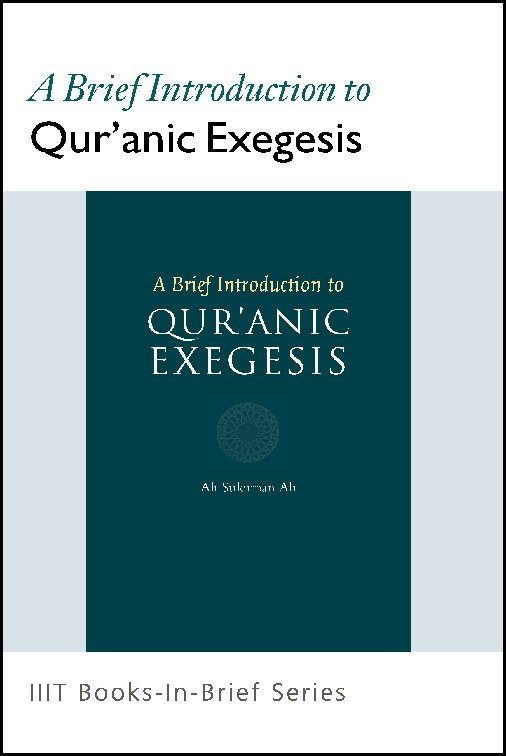
(Abridged edition of the book of the same title by Ali Suleiman Ali)
ISBN: 978-1-56564-985-9, 2017
Generating precise comprehension of the Qur'an and the true meaning of its verses is arguably the essence of the most important of the Islamic sciences, Qur’anic exegesis or tafsir. Since the passing of the Prophet many scholars have worked hard to bring a proper understanding of the meaning of the Qur’an to Muslims, and indeed to the world at large, as fully as possible, in an attempt to widen knowledge of the guidance contained therein, and how to live life in accordance with its principles. The result has been a wealth of historical Muslim literature on the subject which has come to be known as Ulum al-Tafsir or the sciences of tafsir, a systematic exegesis of the Qur’an following several methodologies. This work traces the evolution of Qur’anic exegesis, from the time of the Prophet, the Companions, the Successors, the early mufassirun (exegetes) with independent tafsir works, to the present day. In doing so, it addresses some major issues including to what extent has tafsir been influenced by differing theological traditions (classical, mystical sufi, persian), political and sectarian interests etc. and how interpretation has differed in some cases, mainly pertaining to juridical, theological, historical, and linguistic issues. Certain scholars and Qur’anic commentaries have stood the test of time and stand in greater prominence to others. Their works are introduced, and different methodologies compared and critiqued. What we are left with is a broad yet important overview of a subject which otherwise can be too complex and extensive for the ordinary reader to grasp acting as a valuable addition to his/her understanding and study of the Qur’anic text.
Books-in-Brief (No.18): In Service of God and Humanity
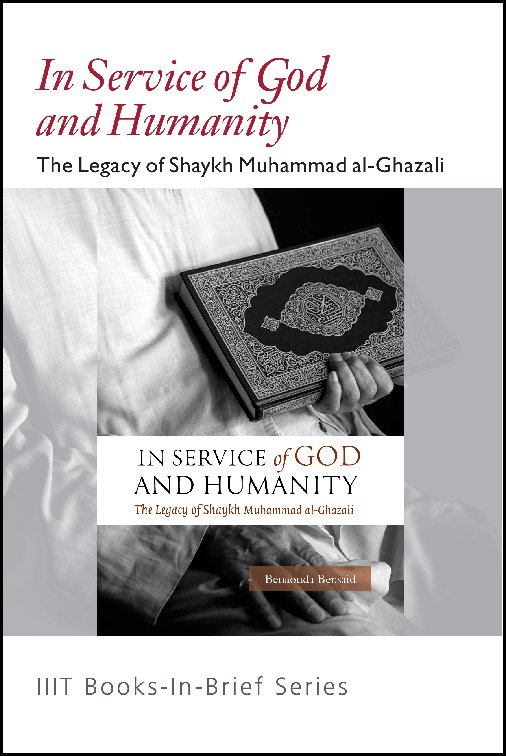
(Abridged edition of the book of the same title by Benaouda Bensaid)
ISBN: 978-1-56564-692-6, 2016
In his passionate devotion to the task of inviting others to Islam, Muhammad al-Ghazali (1917-1996) presented Muslims with a powerful critique of themselves, not only in their endemic failure to project Islam in the best, most reasoned light, but also in their betrayal of the Qur’an’s spiritual principles and the highest standards set by the Prophet Muhammad. This work analyzes al-Ghazali’s critique of du'at (those inviting to Islam) and the practice of da¢wahwork itself (the call to Islam). It also examines his methodology, various proposed solutions, and the juristic responses to his perspective. The evolution of al-Ghazali’s thought and the people and factors influencing him are key elements of the study. It is hard to conceive where the state of discourse on da¢wah and Islamic reform would be without al-Ghazali’s outstanding contributions. The powerful stand he took on the importance of education, the significant weight he gave to a free society, his promotion of a decent standard of living for the poor, the qualities of moral and personal excellence he appealed for, and his compassionate, impassioned role as an educator, all these preserve al-Ghazali’s reputation, both in his own lifetime and for many generations to come, as one of the twentieth century’s most important Muslim intellectual thinkers and reformers. His legacy is founded on a lifetime of service.
Books-in-Brief (No.17): Contemporary Approaches to the Qur'an and Sunnah
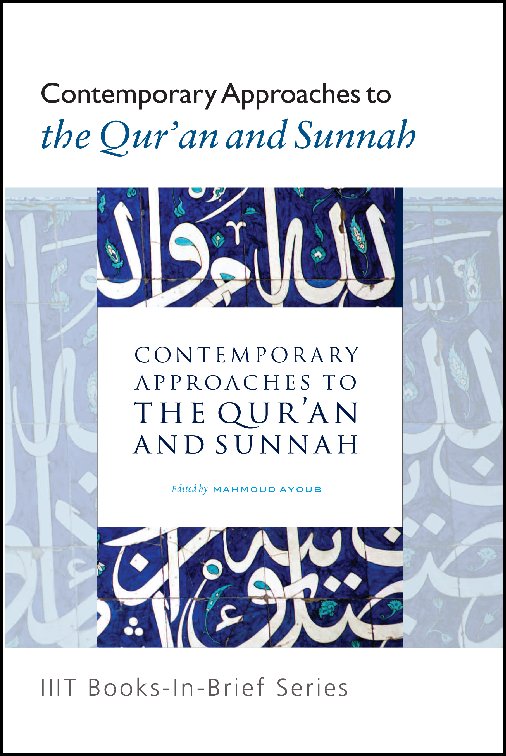
(Abridged edition of the book of the same title by Mahmoud Ayoub)
ISBN: 978-1-56564-684-1, 2016
The Qur’an and the Sunnah are the two primary sources of Muslim faith, life, law and morality. The Qur’an is for Muslims the foundation of their faith and the Sunnah is the framework of their morality. Together they constitute the two sources of the law (Shari'ah) of God, a guide to prosperity and happiness in this life and to the bliss of the hereafter. Although the Qur’an and Sunnah are materially and formally two independent sources, they are inextricably bound in a dynamic relationship. The rulings and precepts (ahkam) of the Qur’an constitute the law (shar') of God. They are supplemented by the precepts of the authentic Sunnah, which possess authority second only to the precepts of the Qur’an. The Qur’an commands Muslims,
Whatever the Messenger gives you, that you must take, and whatever he forbids you, you must desist therefrom... (59:7).
In answer to this need, IIIT convened an annual Summer School for scholars to study the Qur’an and Sunnah. The ten papers included in this volume constitute the proceedings of the first Summer Institute, 2008. The essays making up the collection are focused discussions, and comprised of diverse writings on significant subjects relating to the Qur’an and the Sunnah, of common and intellectual interest as well as relevancy.
Books-in-Brief (No.16): Epistemological Integration: Fundamentals of an Islamic Methodology
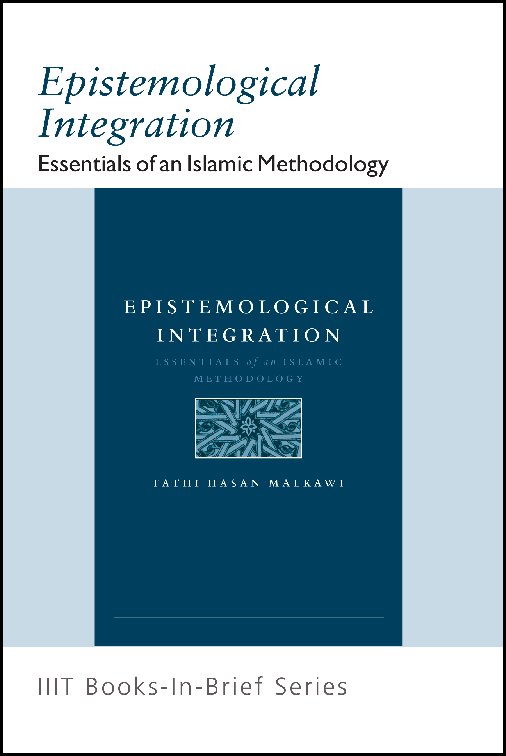
(Abridged edition of the book of the same title by Fathi Hasan Malkawi)
ISBN: 978-1-56564-675-9, 2015
Epistemological Integration: Essentials of an Islamic Methodology is a program which seeks to construct an intellectual framework for Islamic methodology with a view to realizing practical training in the thoughtful investigation of issues related to knowledge in various fields. The book’s title affirms the distinctive types of integration that characterize Islamic methodology, including integration of sources, means, and schools of thought, as well as existing realities with desired ideals etc. This is fully consistent with human nature, as variety is fundamental to the functions people perform and skills they master. The work essentially makes the case that fundamental to any Muslim recovery is laying the foundations of sound thinking and values that integrate the two main sources of knowledge: Revelation and Reality (that is the created worlds, physical, societal and psychological) under the umbrella of Tawhid. This concept of integration implies using both human theoretical conceptualization and practical experimental investigation whilst also affirming the need to apply human capabilities in understanding the divine text, and acquiring sound knowledge of the physical world in terms of its resources, as well as accumulated past and present human experiences. The aim being to vitalize human potential and creativity. Every methodology is associated with both mental activity and practical procedures for constructing thought systems needed to solve problems and answer questions. Hence the integration of thinking, research and practice is fundamental to any methodology. Islamic methodology adopts that and extends human hopes to integrate efforts so that humanity can realistically achieve prosperity on earth and earn eternal happiness in the afterlife.
Books-in-Brief (No.15): Understanding Maqasid al-Shari'ah: A Contemporary Perspective
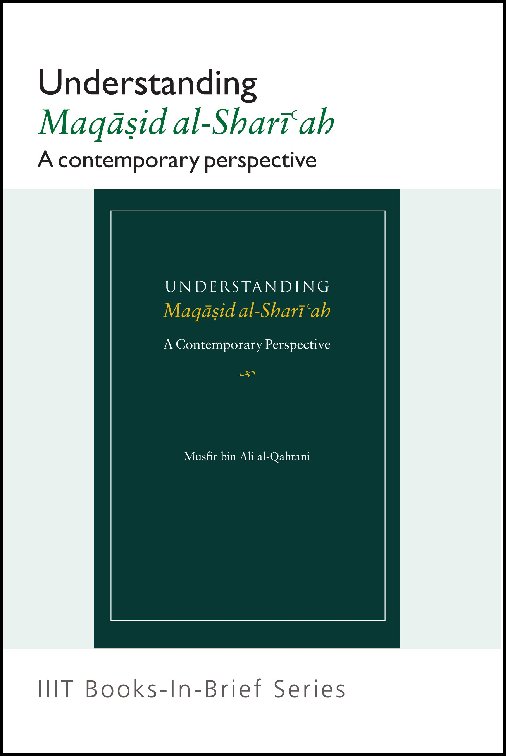
(Abridged edition of the book of the same title by Musfir bin Ali al-Qahtani)
ISBN: 978-1-56564-669-8, 2015
Understanding Maqasid al-Shari'ah calls for the development of a juridical sense that is finely tuned to the higher objectives and purposes of Islamic rulings, the aims of which are the formulation of a new methodology in understanding the revealed texts and the reform of Muslim thought and its application. Al-Qahtani draws attention to the importance of understanding various levels of maqasid, including distinguishing between primary aims (al-maqasid al-asliyyah) and secondary aims (al-maqasid al-tabi'ah). He asserts that a positive understanding of the objectives of the Shari'ah should produce affirmative human as well as cultural development in Muslim societies.
One particular strength of this work lies in the author’s application of the higher objectives and aims of the Shari'ah to different areas of jurisprudence, such as in deriving and issuing religious rulings (ifta'), and to important social issues and challenges facing Muslim societies today. These include the role and status of women, problems of extremism and laxity, the misapplication and abuse of the Shari'ah, the crisis of Muslim thought, and the need to counter religious excessiveness. In addition issues often overlooked but important for mental well-being and societal welfare are assessed, including the need for recreation and leisure, and the active cultivation and promotion of aesthetics and harmony.
Books-in-Brief (No.14): Ethics of Reproductive Medicine: A Comparative Study of Western Secular and Islamic Bioethics
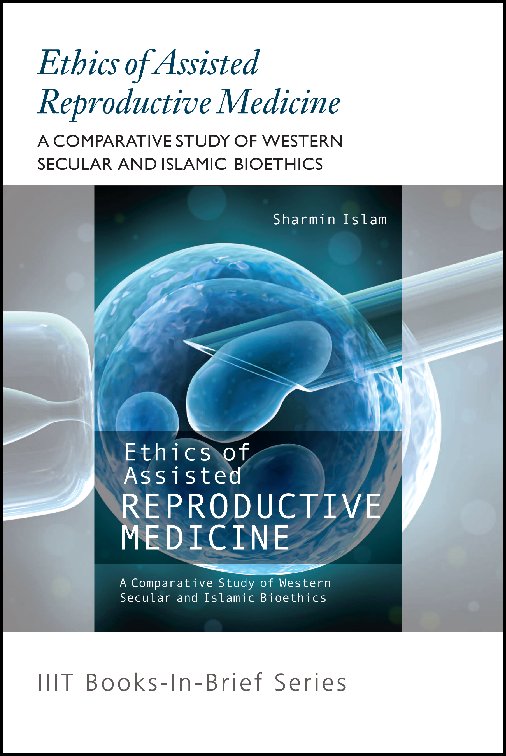
(Abridged edition of the book of the same title by Sharmin Islam)
ISBN: 978-1-56564-673-5, 2015
Ethics of Assisted Reproductive Medicine compares and contrasts Western and Islamic models of bioethics, a little understood but hugely important field in the world of genetics, advanced medicine, and medical ethics, which has developed over the last few decades into a major field of inquiry. With advances in medicine progressively transforming our understanding of what constitutes life, there is need for a medical ethics to address many of the issues and challenges arising, particularly in genetics and reproduction. This is vital as developments in modern medicine (controversially stem-cell research, human cloning, and the right to end life) can lead to potentially harmful practices being legitimized through health care policies into practice, with the general public largely unaware that some powerful lobbying is taking place behind the scenes. What is ethical, and what is not? Who decides andon what basis?
Of central significance are serious moral dilemmas confronting medical experts which require a theological perspective. Yet it is secular bioethics that is defining what constitutes human life and it is secular bioethics that is influencing policy on matters which concern us all and are likely to have grave societal impact. Is it right for a woman to act as surrogate for her sister? Or for a childless couple to resort to artificial insemination by donor? What does Islam have to say? Human cloning, surrogacy, and IVF, are some of the more hotly contested topics. The author analyzes these rigorously.
This work makes the case that the Islamic perspective (taken from the Qur’an and the Sunnah) provides a viable and clear alternative that goes beyond the dominance of the secular and its various philosophical bases, to give Revelation and spiritual understanding precedence. In doing so, keeping to principles, it charts the way out of a confused circle of opinion that is making it very hard to decide “what is best.” It also challenges a secular understanding which sees the human body as little more than tissue, organ, and brain, not soul, consciousness and mind.
Books-in-Brief (No.13): Toward Our Reformation from Legalism to Value-Oriented Islamic Law and Jurisprudence
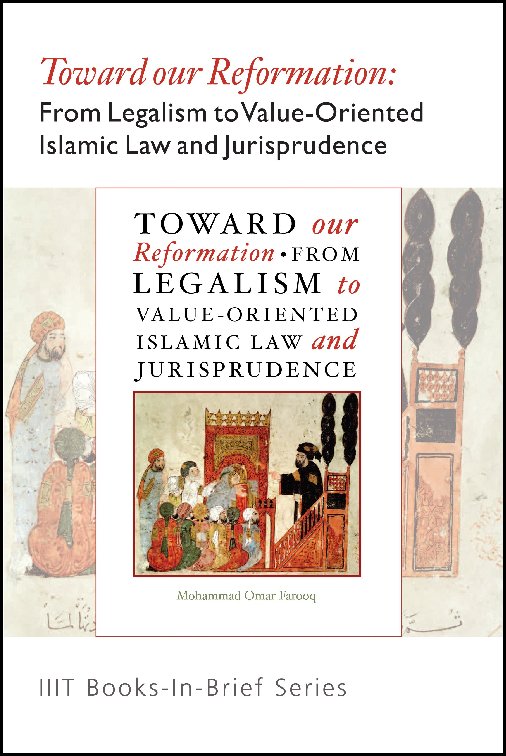
(Abridged edition of the book of the same title by Mohamed Omar Farooq)
ISBN: 978-1-56564-674-2, 2015
Toward our Reformation contends that at the heart of the Muslim predicament lies ignorance and/or lack of commitment to core Islamic values. Thus the work advocates strongly a return to what is termed a “value-oriented” approach. We further learn that the Shari'ah is in effect an original hub which, with the passage of time, has become enveloped in a labyrinthine shroud of scholastic views and deductions hindering Muslim development, and that to rely extravagantly on questionable hadith and fallacious implementation of hudud law is not only to betray the spirit of the Qur’an and the Prophet’s message, but a disastrous exercise, consequences being blatant abuse of the Muslim populace under cover of implementing a pseudo-Shari'ah. This abuse and misapplication is explored throughout the work.
"An excellent work on the main sources of Islamic Law, the Qur’an, Sunnah, Ijma' and Qiyas. The author has discussed many vexing questions pertaining to these sources, their definitions, use and interpretations. He has highlighted the stagnation and literalism in law in the past and the need for value orientation in the future development of Islamic Law."
Shah Abdul Hannan, Former Chairman, Islami Bank Bangladesh; Former Deputy Governor, Bangladesh Bank
"A refined and sophisticated analytical research work leading finally towards some conclusive remarks about the legal dilemma of the contemporary Muslim world."
Dr. Mohammad Yusuf Siddiq, Department of History & Islamic Civilization, University of Sharjah, United Arab Emirates
"With clear prose and thoughtful arguments, [the author] leads readers through the [issues] surrounding the faith and its core elements today, then offers persuasive resolutions to them. Moreover, he carefully indicates how older authorities might be read with an eye to the issues of the day. Indeed, his main concern here is to show clearly how Islam can respond positively to the many innovations of this age without losing any of its core appeal."
Professor Charles E. Butterworth, Emeritus Professor of Government and Politics, University of Maryland, USA
"Some of the chapters make very painful reading indeed. But that is what is out there in reality. The author is only holding a mirror to our face. [The crisis we are facing today] is what comes out of a methodology that neglects the Maqasid al-Shari¢ah, relying exclusively on fiqh rulings given hundreds of years ago in a different social milieu. Some stocktaking is seriously overdue."
Dr. M.N. Siddiqi, Professor Emeritus, Department of Business Administration, Aligarh Muslim University, India
Books-in-Brief (No.12): Mapping the Secular Mind: Modernity's Quest for a Godless Utopia
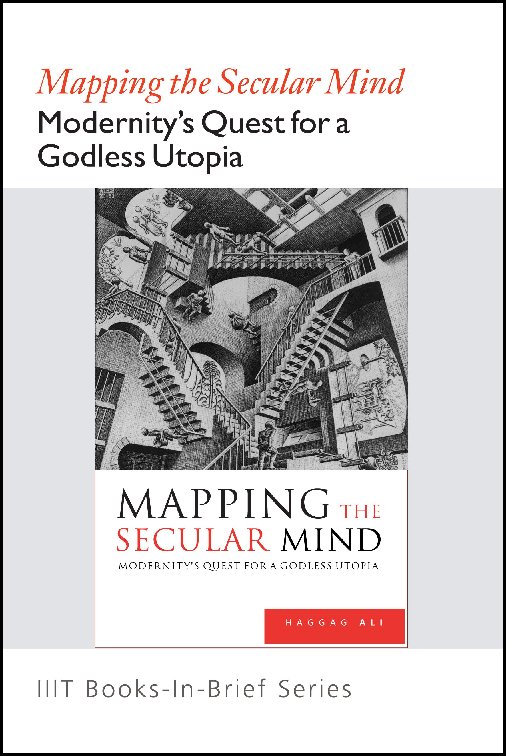
(Abridged edition of the book of the same title by Haggag Ali)
ISBN: 978-1-56564-559-2, 2013
Mapping the Secular Mind critically examines issues of reason, rationality, and secular materialism, to explore how these mental perceptions, or ways of mapping the world, have affected human interaction and sociological development. It does this by comparing and contrasting the ideas of Abdelwahab M. Elmessiri (1938–2008), a leading Arab intellectual, and Zygmunt Bauman (1925), one of the world’s foremost sociologists. In the last few decades, an emergent Western critique of modernity has inspired Muslim intellectuals to develop new ideas, images, terms and concepts that state their positions towards the tendencies of secular modernity, its transformations and consequences, and how it manipulates perceptions of reality. The secular mind had a grand plan, to establish an earthly paradise, a utopia of the here and now, a modern civilization governed by human reason, rationality, and the triumph of progress. Whilst ideals are one thing, the means to realize them is something else. Away from the hype, emancipating humanity from the ‘shackles’ of God and religion has proved no easy matter.
Books-in-Brief (No.11): Imam Al-Shatibi’s Theory of the Higher Objectives and Intents of Islamic Law
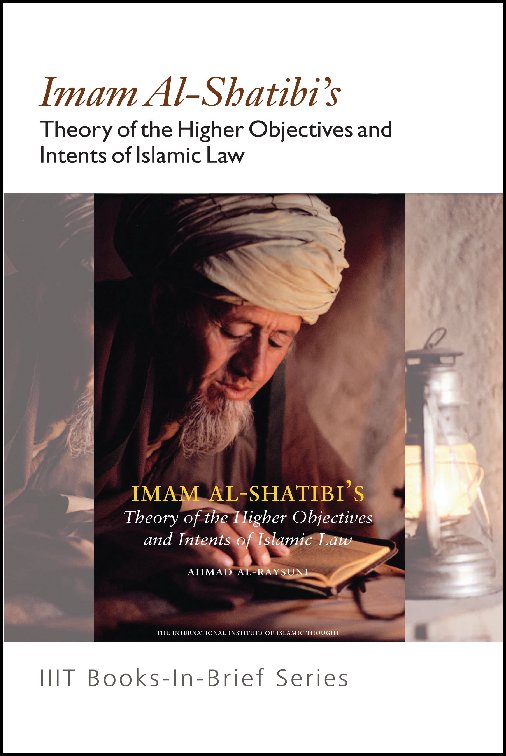
(Abridged edition of the book of the same title by Ahmad al-Raysuni)
ISBN: 978-1-56564-550-9, 2013
With the end of the early Islamic period, Muslim scholars came to sense that a rift had begun to emerge between the teachings and principles of Islam and Muslims’ daily reality and practices. The most important means by which scholars sought to restore the intimate contact between Muslims and the Qur’an was to study the objectives of Islam, the causes behind Islamic legal rulings and the intentions and goals underlying the Shariah, or Islamic Law. This book represents a pioneering contribution presenting a comprehensive theory of the objectives of Islamic Law in its various aspects, as well as a painstaking study of objectives-based thought as pioneered by the father of objectives-based jurisprudence, Imam Abu Ishaq al-Shatibi.
Books-in-Brief (No.10): Ibn Ashur: Treatise on Maqasid al-Shari'ah
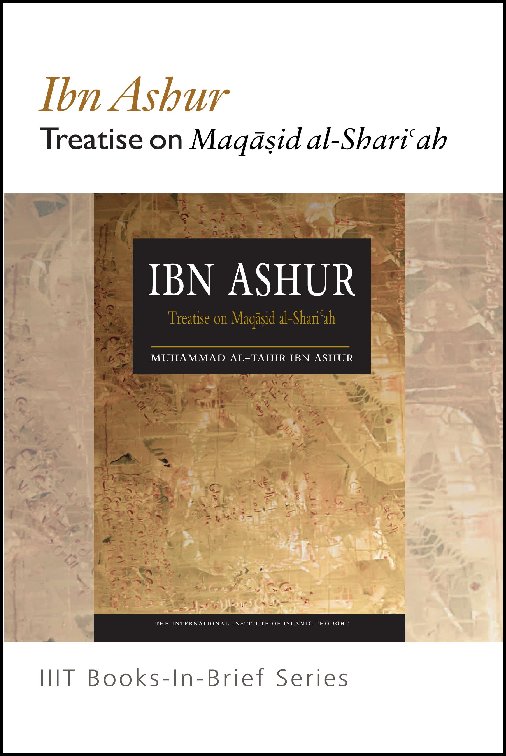
(Abridged edition of the book of the same title by Muhammad Al-Tahir Ibn Ashur)
ISBN: 978-1-56564-551-6, 2013
Shaikh Muhammad al-Tahir Ibn Ashur is the most renowned Zaytuna Imam and one of the great Islamic scholars of the 20th century. The publication of this translation of Shaikh Ibn Ashur’s Treatise on Maqasid al-Shari'ah is a breakthrough in studies on Islamic law in the English language. Ibn Ashur proposes Maqasid as a methodology for the renewal of the theory of Islamic law, which has not undergone any serious development since the era of the great imams. Ibn Ashur also addressed the sensitive topic of the intents/Maqasid of Prophet Muhammad oe behind his actions and decisions. He introduced criteria to differentiate between the Prophetic traditions that were meant to be part of Islamic law and the Prophetic actions/sayings that were meant to be for the sake of specific purposes such as political leadership, and conflict resolution. But his most significant contribution in this book has been the development of new Maqasid by coining new, contemporary, terminology that were never formulated in traditional usul al-fiqh. For example, Ibn Ashur developed the theory of the ‘preservation of lineage’ into ‘the preservation of the family system’, the ‘protection of true belief’ into ‘freedom of beliefs’, etc. He also introduced the concepts of ‘orderliness’, ‘natural disposition’, ‘freedom’, ‘rights’, ‘civility’, and ‘equality’ as Maqasid in their own right, and upon which the whole Islamic law is based. This development opens great opportunities for Islamic law to address current and real challenges for Muslim societies and Muslim minorities.
Books-in-Brief (No.9): The Socio-Intellectual Foundations of Malek Bennabi's Approach to Civilization
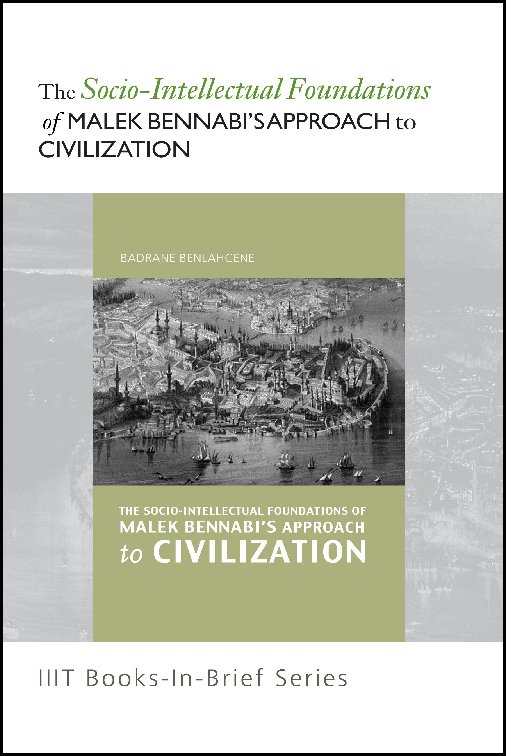
(Abridged edition of the book of the same title by Badrane Benlahcene)
ISBN: 978-1-56564-596-7, 2013
Renowned Algerian intellectual and scholar Malek Bennabi (1905–1973), was concerned with unravelling the causes of Muslim decline and the reasons for Western civilization’s success and achievements. The key problem he theorized lay not in the Qur’an or the Islamic faith but in Muslims themselves. This study investigates Bennabi’s approach to civilization using metatheorizing methodology to examine his thesis and shed further light on perhaps one of the more intriguing elements of his theory, that civilization is governed by internal-external and social-intellectual factors and that an equation can be generated for civilization itself. This equation of Man+Soil+Time = Civilization and of which religion forms the all-important catalyst, is analysed and its significance in terms of the reversal of Muslim decline evaluated. What is clearly apparent is that for Bennabi, Man is the central force in any civilizing process and without him the other two elements are of no value. With regard to outcomes, Bennabi’s unfailing and unerring conviction that unless Muslims change their spiritual condition they cannot effect any far-reaching, meaningful change in society is echoed in the Qur’anic verse: “Verily, never will Allah change the condition of a people until they change what is in themselves” (13:11).
Books-in-Brief (No.8): The Qur’anic Worldview: A Springboard for Cultural Reform
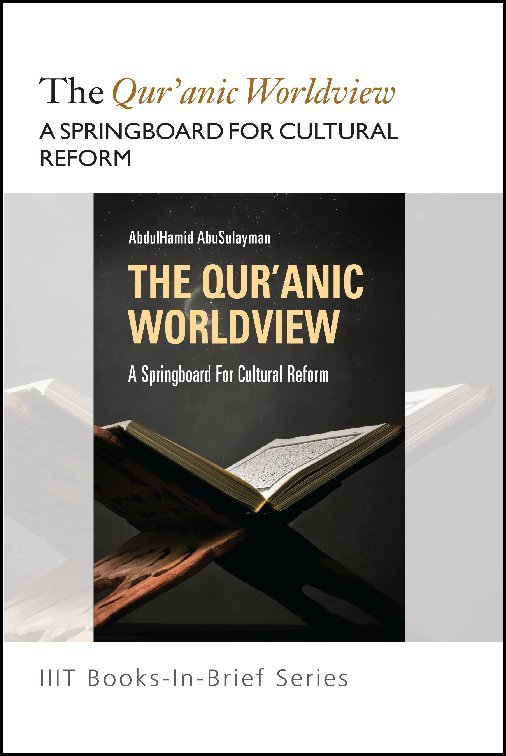
(Abridged edition of the book of the same title by AbdulHamid AbuSulayman)
Paperback, ISBN: 978-1-56564-595-0, 2013, 24pp
The central tenet of this work, which explores the reasons behind the Muslim world’s colossal decline, is that without reinstatement of an ethical, monotheistic, and purposeful perspective on the world and those within it, that is a Qur’anic worldview, genuine and viable revival cannot take place. Of greater importance than the standard admiration of Islam’s ‘golden’ civilization is an assessement of its dormant potential which is what this work attempts to do. Our faith will only be complete when we have become utterly sincere in our love for God, and His Prophet oe, a love expressed in a pure, passionate love for goodness and truth in this world. It was the strict internalization of this perspective and close adherence to the principles of the Qur’an and the Prophetic Sunnah which, contends AbuSulayman, played a key factor in galvanizing the intensely Godconscious followers of early Islam. They adhered to the moral code with a passion and conviction which modern Muslims have lost, shaping their destiny with a boldness of vision that could only have come about because of it. The rebirth of Islamic identity through this Qur’anic worldview is the key requirement of our times and what will bring this disastrous state of affairs finally to an end.
Books-in-Brief (No.7): Epistemological Bias in the Physical and Social Sciences
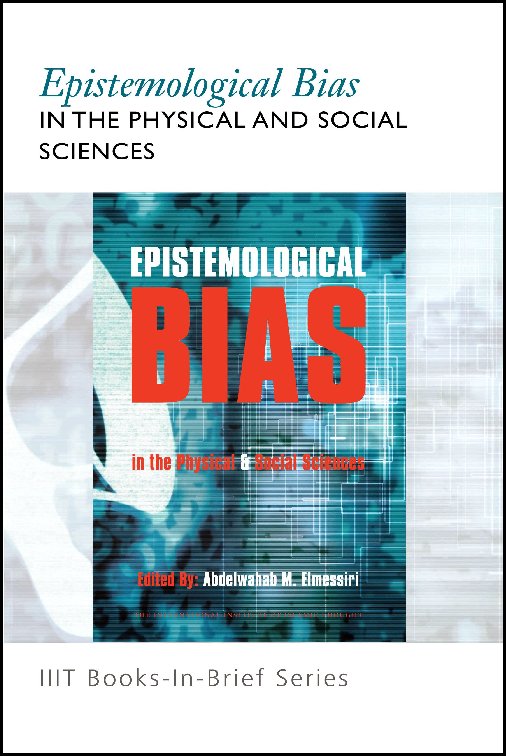
(Abridged edition of the book of the same title by Abdelwahab M. Elmessiri)
Paperback, ISBN: 978-1-56564-592-9, 2013, 26pp
The Western cultural paradigm, dominating academia, is one of the most widespread and accepted forms of Bias in existence today. Its influence is felt intensely across the Muslim world and its weight bears down on all forms of study. Precluding reference to the Divine, is it rational for Muslim researchers and scholars to adapt to its demands and for Muslim societies to “reform” to meet that paradigm’s standards? Elmessiri was against philosophical positivism as a way to obtain knowledge seeing it as part of an imperialist epistemology in which the Renaissance has primarily meant the importation of Western thought and theories and the adoption of a foreign paradigm focused on utilitarian materialism which attempts to impose itself upon Muslim thought and society. In his opinion this cannot serve as a model for development. The collection of writings making up this anthology explore and critique just this, a near total adoption by Muslim scholars of both paradigms, terminologies and research models alien to the socio-economic-religious realities of the Muslim world and the consequences of submitting to this framework as the only rational way of obtaining knowledge and understanding the human condition.
Books-in-Brief (No.6): AnthropomorphicDepictions of God: The Concept of God in Judaic, Christian & Islamic Traditions: Representing the Unrepresentable
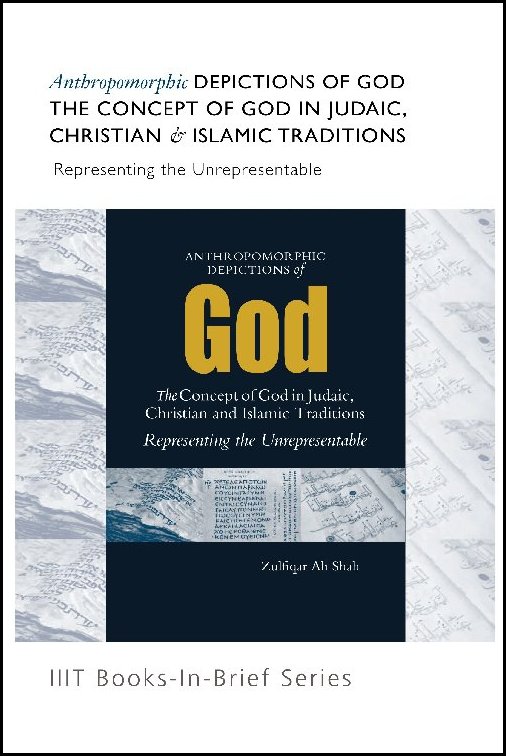
(Abridged edition of the book of the same title by Zulfiqar Ali Shah)
Paperback, ISBN: 978-1-56564-583-7, 2012, 76pp
As secularism debates whether God is dead, the issue of anthropomorphism has become of immense importance. Shah addresses the Judeo-Christian worldview and how each has chosen to framework its encounter with God, to what extent this has been the result of actualscripture, the product of theological debate, church decreesof later centuries and absorption of Greek philosophy. He also examines tawhid and Islam’s strictly anti-anthropomorphic stance. To Shah, anthropomorphic concepts andcorporeal depictions of the Divine are perhaps among theleading factors of modern atheism. As such he ultimatelydraws the conclusion that the postmodern longing for God will not be quenched by pre-modern anthropomorphic concepts of the Divine which have simply brought God down to this cosmos, with a precise historical function and a specified location.
Books-in-Brief (No.5): Studies in Islamic Civilisation: The Muslim Contribution to the Renaissance
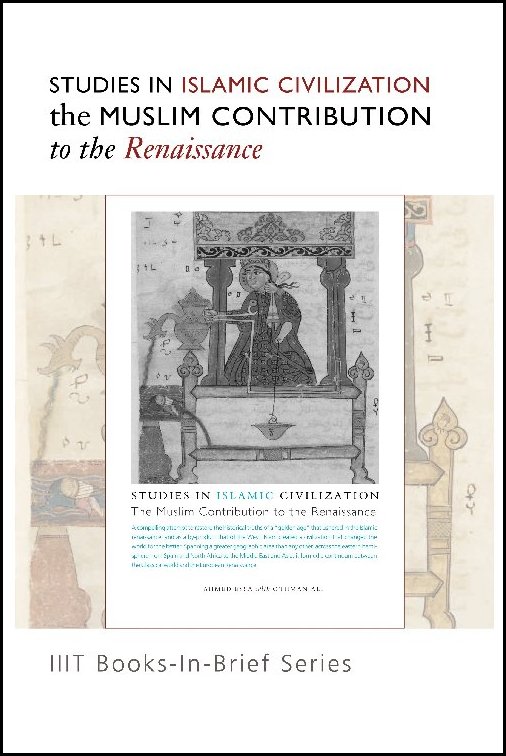
(Abridged edition of the book of the same title by Ahmed Essa & Othman Ali)
Paperback, ISBN: 978-1-56564-591-2, 2012, 28pp
Studies in Islamic Civilization draws upon the works of Western scholars to make the case that without the tremendous contribution of the Muslim world there would have been no Renaissance in Europe. For almost a thousand years Islam was arguably one of the leading civilizations of the world spanning a geographic area greater than any other. It eliminated social distinctions between classes and races, made clear that people should enjoy the bounties of the earth provided they did not ignore morals and ethics, and rescued knowledge that would have been lost, if not forever, then at least for centuries. The genius of its scholars triggered the intellectual tradition of Europe and for over seven hundred years its language, Arabic, was the international language of science. Strange then that its legacy lies largely ignored and buried in time. Studies in Islamic Civilization is a compelling attempt to redress this wrong and restore the historical truths of a “golden age” that ushered in the Islamic renaissance, and as a by-product that of the West.
Books-in-Brief (No.4): Authentication of Hadith: Redefining the Criteria
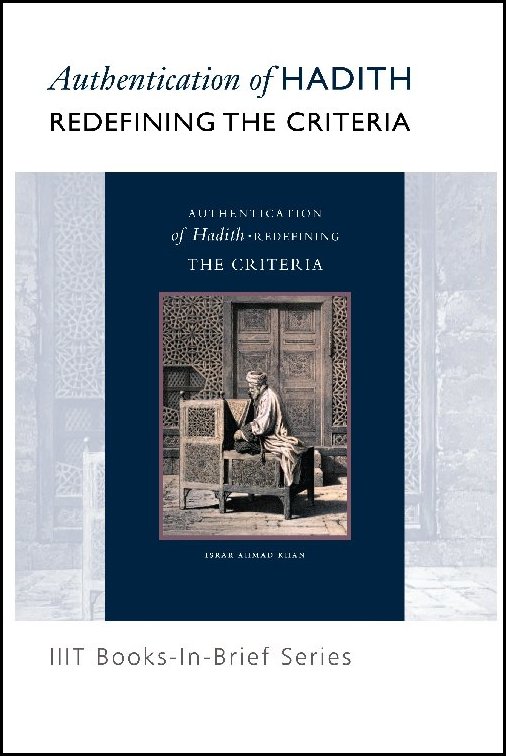
(Abridged edition of the book of the same title by Israr Ahmad Khan)
Paperback, ISBN: 978-1-56564-590-5, 2012, 24pp
In today’s complex and volatile world the consequences of relying on fraudulent and counterfeit Hadith to legitimise extremist behaviour, issue violent fatwas, and justify blatant abuse, particularly of women, is not only far too easy but dangerous. Israr A. Khan traces in careful detail the historical development of the oral and written traditions, as well as the many targeted attempts at fabrication that took place. The author critiques in methodical detail certain hadiths which have come to be widely accepted as “authentic.” Focusing on the criteria adopted by the classical scholars Khan maintains that concentration on the continuity and accuracy of the chain of narrators, rather than the textual content of Hadith, has led to the inclusion of particular hadiths which either contradict other hadiths directly, project the Prophet oe in an uncharacteristic light, or conflict with/do not reflect the teachings of the Qur’an. The prominent collections we have today, were made possible by the development of the science of Hadith criticism, and Muslim scholars deserve deep appreciation for their painstaking work, as well as their invaluable contributions towards preserving the Hadith literature to the best of their ability. However, insists Khan, the process is ongoing, and as such the closed door policy currently surrounding Hadith authentication needs to be carefully re-examined.
Books-in-Brief (No.3): Apostasy in Islam: A Historical and Scriptual Analysis
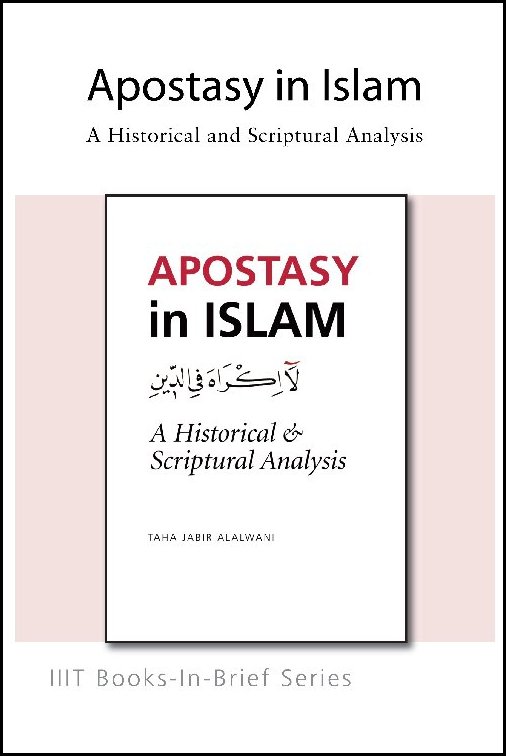
(Abridged edition of the book of the same title by Taha Jabir Alalwani)
Paperback, ISBN: 978-1-56564-585-1, 2012, 24pp
What is the legally prescribed penalty, if any, for apostasy (al-riddah), and how does this relate to the demand for religious tolerance as stipulated in verse 2:256 of the Qur’an “There shall be no compulsion in matters of faith”? It is an established fact that the Prophet never, in his entire life, put an apostate to death. Yet, the issue remains one of the most controversial to have afflicted the Muslim world down the centuries. It is also the source of much damaging media coverage today as Islamic jurisprudence stands accused of a flagrant disregard for human rights and freedom of expression. Taking the life of a person without just cause is according to the Qur’an equivalent to the killing of the whole of mankind. It is vital therefore, that in the interests of compassion and justice, as well as freedom of belief, this subject is clearly addressed once and for all.
Books-in-Brief (No.2): Al-Shura: The Qur'anic Principle of Consultation
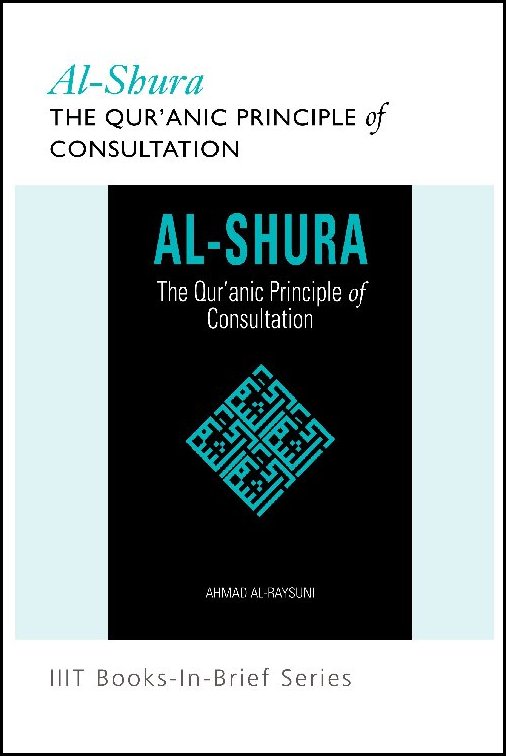
(Abridged edition of the book of the same title by Ahmad Al-Raysuni)
Paperback, ISBN: 978-1-56564-584-4, 2012, 22pp
Muslims remain largely unaware of the importance and value of the Qur’anic principle of al-Shura (mutual consultation) and the significant role it can play in the advancement and reform of Muslim society. In this work, the author attempts to introduce and examine key meanings and practices of al-Shura, trace its historical evolution, and explore ways in which the principle can be introduced, institutionalized and applied in Muslim societies. There is no doubt that al-Shura has been sidelined throughout the Muslim world and the reasons for this are both historically and politically complex. In the opinion of the author, although much has been written on the subject, in reality it has been at best ineffectively applied and at worst heedlessly ignored.
Books-in-Brief (No.1): Rethinking Muslim Women and the Veil: Challenging Historical & Modern Stereotypes
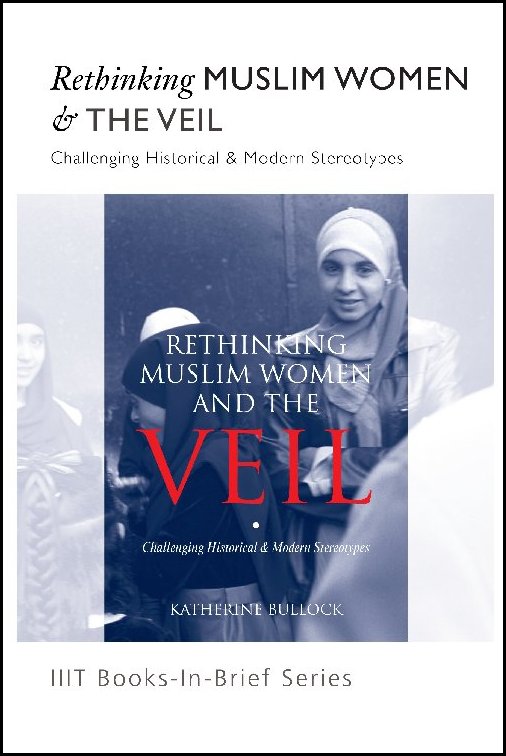
(Abridged edition of the book of the same title by Katherine Bullock)
Paperback, ISBN: 978-1-56564-358-1, 2010, 32pp
Muslims remain largely unaware of the importance and value of the Qur’anic principle of al-Shura (mutual consultation) and the significant role it can play in the advancement and reform of Muslim society. In this work, the author attempts to introduce and examine key meanings and practices of al-Shura, trace its historical evolution, and explore ways in which the principle can be introduced, institutionalized and applied in Muslim societies. There is no doubt that al-Shura has been sidelined throughout the Muslim world and the reasons for this are both historically and politically complex. In the opinion of the author, although much has been written on the subject, in reality it has been at best ineffectively applied and at worst heedlessly ignored.
